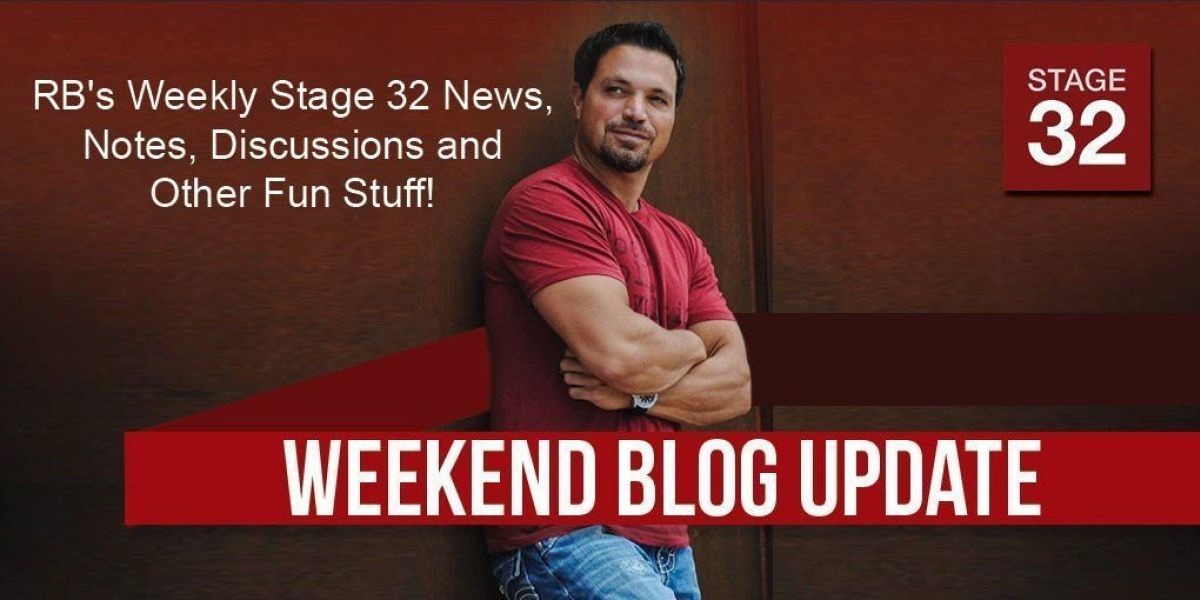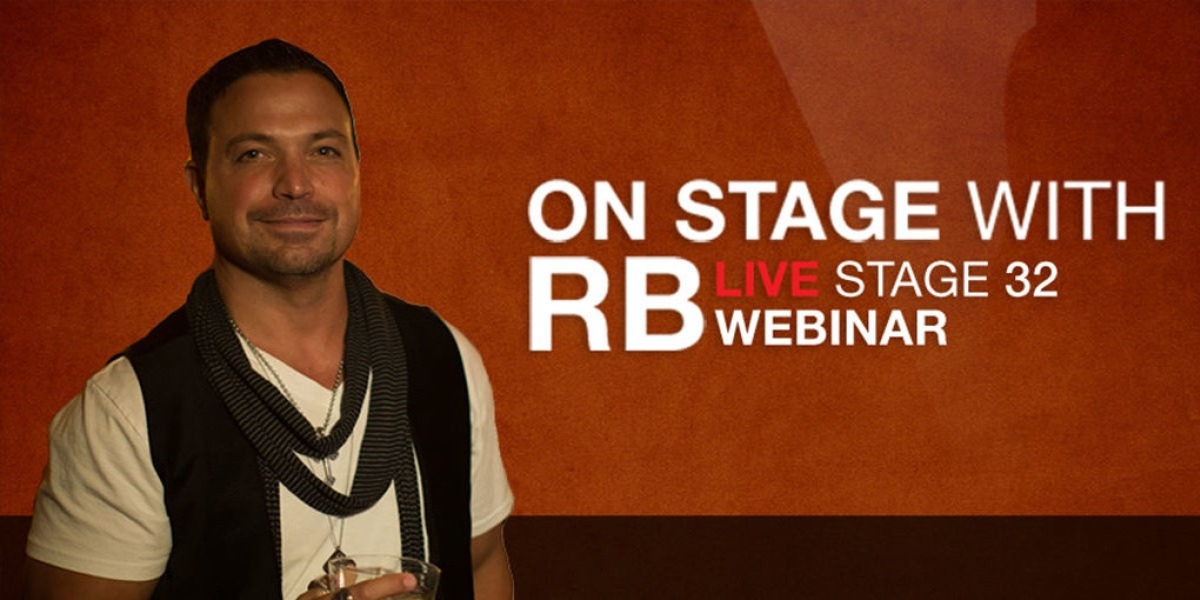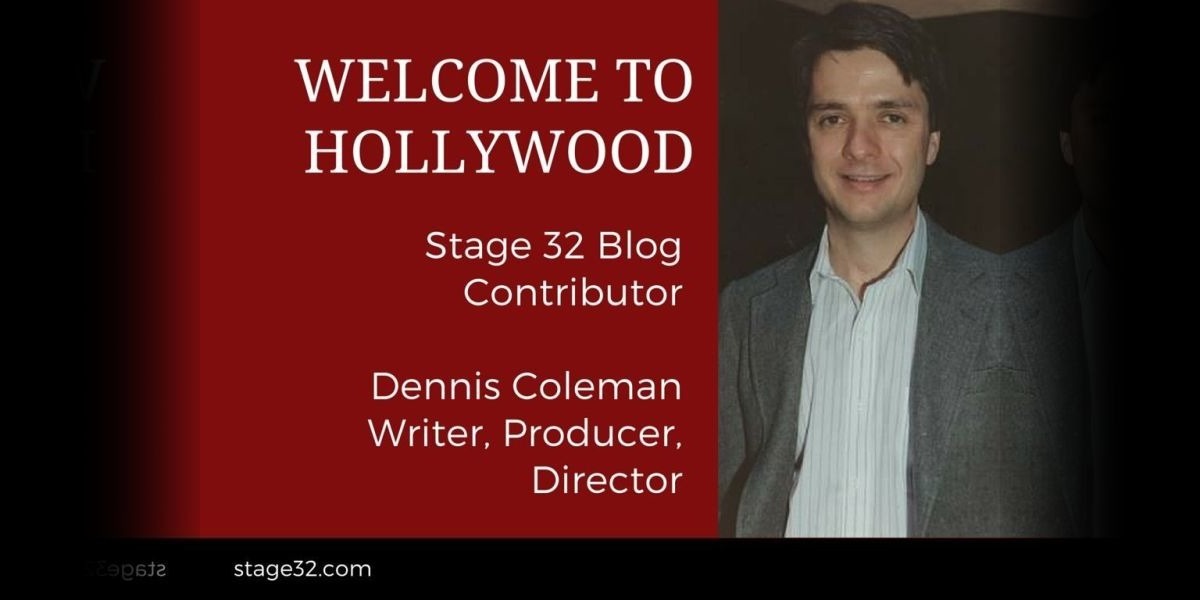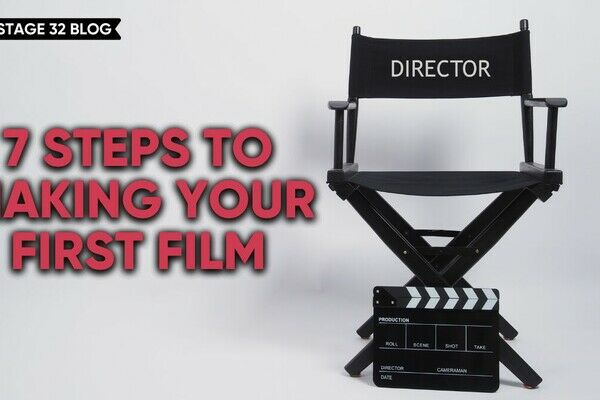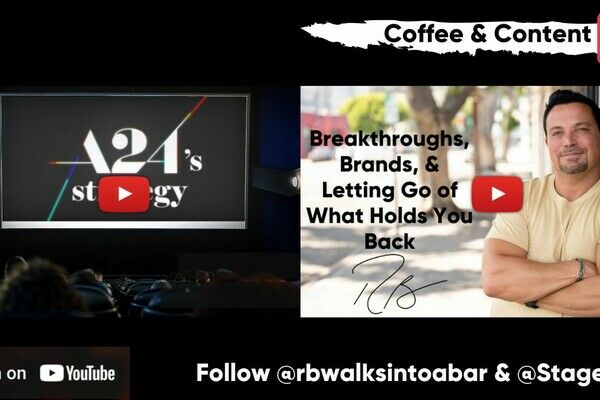Welcome to Hollywood: Getting a Gig
 Richard "RB" Botto
Richard "RB" Botto Today I welcome back regular Stage 32 Blog contributor, Dennis Coleman. Dennis is a writer, producer and director with decades of experience in broadcast television and feature films.
If you missed my announcement welcoming Dennis to the Stage 32 family, you can read about it here
Enjoy!
RB
A lot of you are going to have to come here to Hollywood if you want to work in the movie or TV industry. Sure, there are local gigs just about everywhere and if you’re happy doing that, more power to you. But if you want to play with the big boys and girls, you’ll have to head to southern California. New York and Vancouver are also good, but I can’t really address those cities.
I’m not talking about filmmakers who are already directing and producing their smaller, indie projects. Stay where you are. Trying to do low-budget labors-of-love in Los Angeles is next to impossible. You need clearances and permits and professional crews (they’re worth the money, but they’re going to cost you). If you’re starting out, shoot where you are. If you’re in a small town where you can get the local high school or cemetery or town hall for free, then do it. And keep doing it. Once you’ve caught the attention of the business, they’ll bring you out.
I’m also not talking about writers. Fortunately you can write anywhere and email your projects in (as with the Happy Writers on this site). Again, if you get attention, you’ll be brought out for meetings. But you don’t have to stay here.
But for the rest of you, Hollywood is the place to work in production. I’m going to go through my adventures when I arrived here – and give you some advice along the way.
I came here before the internet was up and running in full force. Now you can look for work online (more on that later), but I couldn’t do that. So right out of college, I hopped on a plane and came to Hollywood. My family thought I was crazy. My Dad, who was a cop, said “you go try that for a year or two then come back and I’ll find you a real job!” (Me, a cop? I can’t stand the sight of blood! Thanks, Dad.) I didn’t know anyone. Well, I knew one guy who’d been in one class in college with me. But I barely knew him. I just knew I loved movies and TV and wanted to dive into it. So out I came. I’d already made a bunch of mistakes before I’d left the ground.
HAVE SOMETHING TO OFFER
If you’re going to look for a job, then you’ve got to have something that would make someone want to hire you. Not just a nice smile and a good attitude. Why should they bother with you? Do you know about lighting and grip equipment? Do you know about editing? Do you know about script formatting? What skills and knowledge do you have that would make you an asset?
I didn’t have any. I was an English major in college. Sure, I’d worked on my friends’ student films, so I had a basic working knowledge of a set, but not very much. And I’d gotten a few professional PA credits on some documentaries a teacher of mine had made. Big deal.
You need to have some experience in local productions. If you went to a film school, that’s a great start. If you do intend to write, come out with four or five finished scripts (properly formatted, which you can find out online). But you’ve got to have something.
What I did was hand out resumés. Hundreds of them. I walked the streets. One day I walked from Sunset Boulevard and Western Avenue to Sunset and Doheny Boulevard (that’s about five miles; and it was in sweltering August heat) stopping in offices and handing them out. But nobody called.
CALL EVERYONE YOU KNOW
I thought I’d do it all on my own, without any help. Well that didn’t happen. So I called the one guy I knew from college. Turns out he was managing a movie theater (the old Pan Pacific Theater on Beverly Boulevard – it’s not there anymore, but it was right on the street in front of the Pan Pacific Auditorium) and he hired me as an assistant manager. So I could at least make a living. We both looked for production work and compared notes about possible contacts. I ended up managing that theater myself for five years, keeping part-time and weekend hours just to make ends meet.
So even if it’s a distant relative or a friend of a friend of a friend, call up anyone you know in Los Angeles or the surrounding area. Even if they’re not in the business, odds are they know someone who is. It’s all about connections.
TAKE THE JOB EVEN IF IT’S NOT THE ONE YOU WANT
Once I had that part-time work, I did finally get a few calls for day gigs as a production assistant. One was for a company that made industrials. (That term isn’t used much anymore, but it’s for in-house training films or educational films for corporations.) The boss scared me. He was old and grouchy and temperamental. But he had a long career, going back to making short films in the 1960’s. He had tons of experience. And even though he yelled at me, he offered to bring me back for more work.
I turned him down. I thought I could do better. Stupid idea. The sound man I worked with told me that he’d been a PA and this old guy had taught him how to do sound. Which is an amazingly generous thing to do. But I didn’t want to do industrials. So I left. It was months before I found another job.
So it may not be your dream job, but take the one that comes your way. Don’t sit around waiting, like the guy who will only go out with the perfect girl. He’s never going to find her and you may not get another offer.
HAVE A PLAN
I could write a good query letter, so I did get in to see some pretty big-name producers. I think they were just curious. One TV producer, who did tons and tons of mini-series, asked me straight out “so what kind of job do you want?” And I fumbled around. I would take anything, any kind of job. But it doesn’t help to say that. You need to say: I want to be a PA on the set or I want to work in the editing room or I want to learn about the camera. Be specific. You can’t say “I want to produce and direct” because they’ll just laugh at you, pat you on your head and send you on your way. So have a plan.
Lots of editors and DP’s (directors of photography) become directors, so decide if you want to take that route. See what works for your personality. Then ask for that kind of work, as a third assistant cameraperson or as an assistant editor or maybe wardrobe or casting. Figure out the plan. Then you’ll know what kind of work you want to do.
HAVE SOMETHING TO OFFER, PART 2
Finally, I did figure out what I had to sell. I was an English major. I could write. I could spell. I could compose letters and treatments. That’s what did it – a low budget film company hired me to run their office and write their letters. I did that for quite a while, also reading scripts for them and offering notes. When they went into production, I got to be on the set as an assistant director. Then I got to be an assistant editor while the film was being edited.
That’s what you have to do: find out what’s unique about you that would appeal to a production company.
JUST DO IT
When you do get a production gig, you have to know that it’s all-consuming. There are long days and long nights. You can’t make other plans. And you can’t complain. Two tiny examples:
One TV company I worked for only had a small copier that could just make one-page copies at a time, by hand. (Hey, they were just starting out and they couldn’t afford a big machine yet.) The boss brought in a huge wire-bound book of hundreds of pages with important distribution information that he needed copied. It was the end of the day. But I had to cheerfully take that book and stay for many hours, copying it page by page. I did it, no problem, no whining.
Another company (and I’ll name it, Marty Pasetta Productions, because old Marty just passed away last year – they showed him on the Emmys In Memoriam segment – he’d directed more Academy Award shows than anyone in history – a great guy, a gruff bear of a guy but always nice to me) always used to send me at the last possible minute to take a package to the FedEx place, which was several miles away. Almost every day, I had to race there right before they closed, find parking, get in with all the proper forms and get the package out. Finally I asked one of my bosses, why do you always pick me to do that run? There are lots of other people here that could do it. His reply: because we know you’ll get it done. That’s it, that’s the key: you have to get it done, no excuses.
You can’t say you have to leave to walk your dog. You can’t take off for some concert or game. You can’t run off for two hours for lunch. You have to do your job. If you’re lucky enough to land one, then you’re married to it.
TAKE THE JOB EVEN IF IT’S NOT THE ONE YOU WANT, PART 2
I never intended to work on TV magazine shows or news shows or reality shows. I liked scripted shows, I liked movies. But when I was starting out, there was more work in TV than in film (kind of like today) and one thing led to another. Doing variety and awards shows with Marty Pasetta led to another company that did the same thing, Smith-Hemion. Then a PA there got a job as a production manager on a new show called “Lifestyles of the Rich & Famous” – and he called me to be a PA there. And on that show, after several years, they let me go out and direct my own stories, let me write and cut other stories for the show. That led to more shows, including many years at “Entertainment Tonight”. So it wasn’t my dream, but it was a great opportunity and I took it. I didn’t say: no, this isn’t why I came to Hollywood. That might not be your decision. Hollywood may have other plans for you. Just take the gig and do your best at it.
FIBBING IS NOT A BAD THING
Most people lie a bit on their resumé – it’s OK, just don’t overdo it. That grouchy old guy who hired me for one of my first gigs kept talking about “your lying resumé”. Sometimes you have to stretch the truth to get the job. Just be sure you can do the job once you get it.
After I’d worked at “Lifestyles of the Rich & Famous,” I had an interview for another TV interview show on which they went on location and did multiple-camera interviews with celebrities. I’d only worked on one-camera interviews. But when they asked “have you done multiple camera shoots?” I said: “absolutely!” Because I knew I could handle it. I’d seen it done. And I got the job and worked on that show for a year (it only lasted a year, which is why I’m not naming it but it was a good job.) Go ahead and push the boundaries of truth, as long as you can get it done when you get the job!
DON’T AIM TOO HIGH
As I said earlier, you can’t come out and tell everyone you’re going to produce and direct. That’s what the majority of people here want to do. Get in line. Find the path you want to take and start at the bottom there.
When I worked at “Entertainment Tonight,” we had many interns work there and go out with us on shoots. 99.9% of them said they either wanted to be the host of the show (like Mary Hart on ET) or the Executive Producer, the boss in charge of everything. We smiled and sent them on their way. They hadn’t figure out the right path; they were aiming too high. Finally one intern said he wanted to learn about the camera and a young lady said she wanted to learn to edit. We said: “Great! Here’s how you start!” Because those are reasonable goals.
ONLINE JOB HUNTING
That’s what I did to find work here in Hollywood. You may not have to go through all that. First of all, you're in the right place on Stage 32. I mean, that's what we're here for - to connect with each other, learn and work.
Always check the Stage 32 Jobs section: https://www.stage32.com/find-jobs
Plus, there are lots of good entertainment job sites around. Some that I’ve found useful are: http://www.entertainmentcareers.net/ and http://staffmeup.com/ and http://filmandtvpro.com
There’s also http://www.mandy.com/ which is mostly unpaid work on student films or small-budget projects, but it’s a good way to get experience and meet people and make connections.
Most of the major studios and networks have job sites. Here are some:
http://www.timewarner.com/careers
http://disneycareers.com/en/search-jobs/advanced-search/
http://www.viacom.com/about/pages/careers.aspx
I hope all this information has given you some ideas on how to plot your career. Next time I plan on giving you advice on how to handle interviews. See you then!
Like this blog post? Please share it on social media (Facebook, Twitter, LinkedIn, email etc) by using social media buttons at the top of the blog. Or post to your personal blog and anywhere else you feel appropriate. Thank you.
As always, we welcome thoughts and remarks on ANY of the content above in the Comments section below...
| RB's Stage 32 News, Notes, Discussions and Other Fun Stuff (October 16, 2015) |
| On Stage With RB (October 2015) Announced! |


